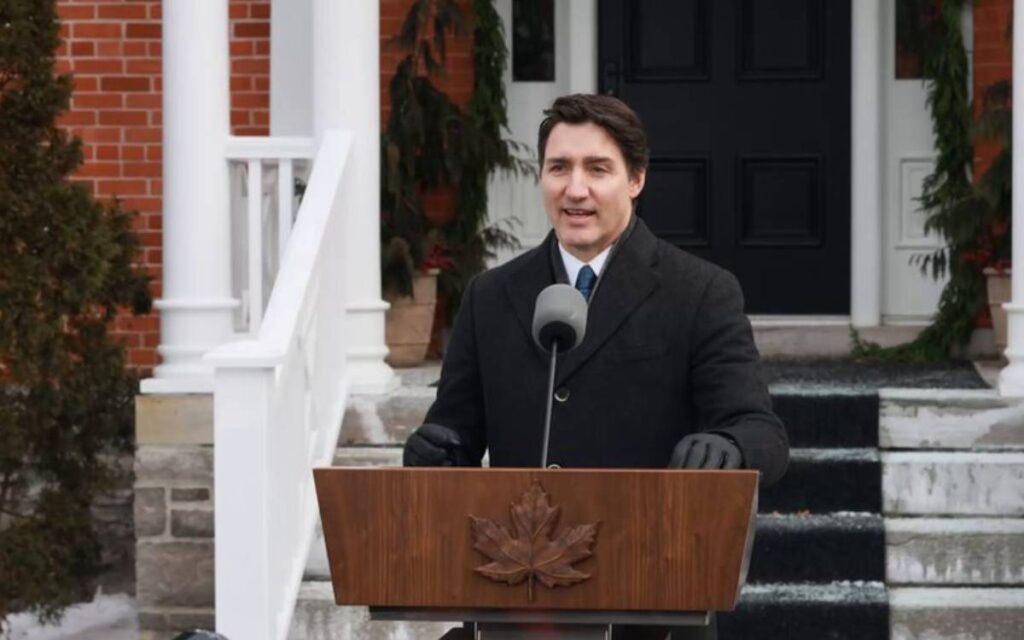
The majority of middle-class families paid higher taxes under Trudeau’s watch. Pictured: Prime Minister Justin Trudeau. Photo Credit: Justin Trudeau/X.
As the post-mortems continue on Prime Minister Justin Trudeau’s time in office, a frequent claim by the defenders of his regime talk about how much Trudeau did for Canada’s middle class. One claim in particular is that Trudeau’s Liberals reduced taxes on the middle class. Trudeau is currently making the rounds of U.S. media for some reason, and this claim that he reduced taxes on middle class Canadians has been one of his boasts. In fact, Trudeau states this was one of his key accomplishments in his time as Prime Minister.
Unfortunately, like many of Trudeau’s statements, there is no basis in fact for this assertion. A recent commentary by the Fraser Institute puts the lie to this claim. While it is true that, early in the Trudeau government’s tenure, it did reduce the personal income tax rate in the second-lowest tax bracket from 22 per cent to 20.5 per cent. However, at the same time the Liberal government eliminated a number of tax credits that could be taken advantage of by the middle class – things such as the child fitness credit, child arts credit, public transit credit and provisions for income splitting.
The cumulative result of these changes meant that the majority of middle-class families ended up paying higher taxes. An earlier Fraser Institute analysis showed that about 90 per cent of middle-income families paid more personal income taxes in total because of the Liberal tax changes. And this did not even factor in the impacts of new taxes such as the carbon tax.
The Fraser analysis showed that personal tax increases were widespread across virtually all income groups. In total, 61 per cent of families are facing higher personal income taxes than they did when the Trudeau government was elected in 2015.
As always seems to be the case with socialist governments, the Trudeau Liberals boasted about their “tax the rich” strategy as they created a new high income tax bracket for those earning more than $200,000. The income tax rate for this group increased from 29 per cent to 33 per cent. This threshold affects about two per cent of Canadians, and many might think this is an appropriate tax policy as it imposes a high tax rate on the so-called rich. However, it is worth considering that those people with incomes over $200,000 – hardly Warren Buffet territory – tend to be the professionals, entrepreneurs, doctors, engineers and other desirable groups that we would like to attract and keep in Canada.
Under the Trudeau government, the disparity between income tax levels in Canada as compared to the U.S. has increased considerably, and we are losing businesses and professionals as a result. Although most people tend to support “tax the rich” strategies as they believe it won’t affect them, many countries around the world have attempted this over the years with dismal results. The Trudeau Liberals attempted another version of “tax the rich” with their capital gains tax increase in the 2024 federal budget. While this was sold as a measure that would only affect the “ultra rich” according to then-finance minister Chrystia Freeland, most Canadians quickly caught on to the fact it would punish many average income Canadians who might own a cottage, a second property or other assets.
The Fraser analysis pointed out that in 2018, half of all taxpayers who claimed more than $250,000 of capital gains, after which taxes would increase under the new rules, had an income level of less than $118,000. In other words, hardly the ultra-rich. It’s encouraging that Canadians saw through this ruse and the Liberals did not pick up any support for this change in the capital gains inclusion rate. Let’s hope this is the beginning of better tax literacy on the part of Canadians who are not fooled by promises to tax the rich while the real impact is to affect mostly average Canadian taxpayers. Let’s also hope than a change in government with a new Prime Minister Poilievre in place will reverse this foolish tax change that discourages investment in Canada and negatively affects average income Canadians.
Trudeau’s government has for years made a point of focussing on the prevalence of “misinformation and disinformation,” and has used this as an excuse for their numerous attempts to censor content, notably on the internet and in some legacy media. Thankfully, one of the few positive outcomes of Trudeau’s prorogation of Parliament is that one of the pieces of legislation that died as a result was Bill C-63, the so-called Online Harms Act. Under the Trojan horse of pretending this legislation was all about cracking down on child pornography and other online content that was damaging to children – things all decent Canadians would support – this proposed law actually had would have had the effect of putting the internet under government control.
Now that the Trudeau government is on the way out, there will be lots of commentary on what it did and did not accomplish during its almost decade in power. Once a closer examination is undertaken, claims to a range of “accomplishments” such as reducing taxes on the middle class are not supported by fact. Indeed, it appears that the main source of misinformation and disinformation has been the Trudeau government itself.

She has published numerous articles in journals, magazines & other media on issues such as free trade, finance, entrepreneurship & women business owners. Ms. Swift is a past President of the Empire Club of Canada, a former Director of the CD Howe Institute, the Canadian Youth Business Foundation, SOS Children’s Villages, past President of the International Small Business Congress and current Director of the Fraser Institute. She was cited in 2003 & 2012 as one of the most powerful women in Canada by the Women’s Executive Network & is a recipient of the Queen’s Silver & Gold Jubilee medals.






